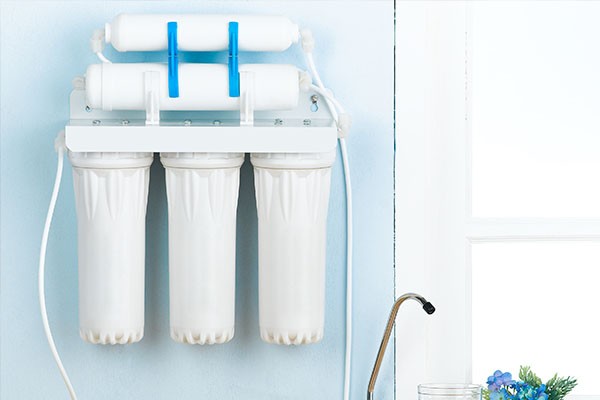
Drinking water is an important part of daily life, but the amount of choice can be overwhelming. Distilled and filtered water are some of the purest options available but choosing between them can be complicated. Budget and health concerns both factor into these two options for safe drinking water.
This article covers the following:
- What is distilled water?
- What is filtered water?
- The difference between distilled and filtered water
- Is filtered water the same as distilled water?
- Distilled water vs. filtered water drinking
- The effects of distilled water
- The effects of filtered water
- What are other differences between distilled and filtered water?
- Can I drink distilled water every day?
- Distilled vs. filtered water
Let’s jump right in!
What is distilled water?
Alexander of Aphrodisia was one of the first to desalinate ocean water using distillation all the way back in 200 AD. Double distillation guarantees the highest level of purity, but some scientists are concerned that essential minerals are removed during the process.
Almost all water contains some impurities, including:
- Minerals
- Nutrients
- Contaminants
Distillation removes these impurities through boiling and evaporation. Some find that it has a flat taste, as it lacks:
- Metals
- Minerals
- Other inorganic compounds
Distilled water is similar to other purified water, varying only in its method of purification. Distillation is an old method, which begins by heating water to its boiling point. The water heats up and eventually evaporates, rising into coiled metal tubes. In the tubes, the vapor cools down, turns into water, and is diverted off for collection.
This water produced is extremely pure because the boiling process kills off bacteria and other microorganisms. Evaporation also leaves behind minerals and other substances in the source liquid that are too heavy to rise with the vapor. The advantage of this is that the highly pure water has room to absorb toxic substances from the body, helping to draw them out and remove them from the body as waste.

Distilled water, by implication, is free from the following contaminants:
Microorganisms – Distillation is the only purification process that completely removes all microorganisms. This is a great benefit to anyone with a compromised immune system, as certain parasites, such as Cryptosporidium, can cause sickness even in healthy people. Cryptosporidium is resistant to chlorine and can result in the death of those with weak immune systems. This is why the Centers for Disease Control and Prevention recommends that such individuals only consume distilled water.
Contaminants – Distillation does remove healthy minerals, but crucially, it also removes heavy metals such as lead, mercury, and arsenic. It also removes any volatile chemicals from cleaning fluid and nitrates, which can affect the body if converted to nitrite, which limits the oxygen-carrying capability of red blood cells. Colorado State University Extension reports that nitrates in water can be especially dangerous for infants, pregnant women, and some adults.
Distillation is an old method, which begins by heating water to its boiling point.
Chlorine – Chlorine, which can affect the taste of water, is often present in water because of municipal water processing operations. It doesn’t usually cause any health problems at low levels, but individuals sensitive to its smell and taste might prefer distilled water, which removes chlorine.
Additives – Municipal authorities often add certain substances to water for health reasons. Calcium is one of those minerals, which is helpful for bone health and development. However, it can be a contributing factor to kidney stone formation. Distilled water gives you complete control over your mineral intake by removing additives.
What is filtered water?
Water filtration is performed using several different methods. Micron filtration is one of the most effective methods for purifying water. It involves using a filtration medium with microscopic holes, which allows it to block any matter larger than the size of those holes, some of which are toxins and other harmful substances. Very well-filtered water earns the “purified” label if it achieves a ratio of less than 10 contaminant parts per million.
One advantage of purified water compared to distilled water is that it retains the dissolved oxygen in the source liquid. This gives it a little more life than when you drink it directly or boil it for coffee or tea.
Here are some common filtration methods that remove unwanted minerals and contaminants:
Reverse Osmosis – This process uses high pressure to push the water through a very fine filter. This filter removes a range of molecules, including harmful microorganisms and pollutants.

Water Filters – These filters function like reverse osmosis systems, but they use larger pores that require less pressure for the water to pass through. The primary function of filters is to remove microorganisms and other pathogens from the water supply. Although effective, they tend not to remove all minerals and chemicals from water. This is a good method for making naturally healthy spring water safe to drink.
Filters vary in function and quality, while your filtration needs may depend on the quality of your tap water. Contact High Water Standard for whole house water filter installation that can provide you with clean, filtered water all day long.
The difference between distilled and filtered water
Both distilled and filtered water can achieve comparable levels of purity. However, distillation also removes all additives and other vital minerals found in water. Our bodies aren’t evolved to drink completely pure water, and you might find it flat-tasting.
Fresh water always contains traces of minerals such as magnesium, calcium, and potassium, all of which our body uses.
Is filtered water the same as distilled water?
No. Although both distilled and filtered water can achieve similar levels of purity, the methods are fundamentally different. Research suggests that filtered water, which can remove most harmful and toxic contaminants, is better for you than distilled water. This is because distilled water lacks the useful minerals typically found in drinking water.
Distilled water vs. filtered water drinking
There is nothing wrong with drinking an occasional glass of distilled water. However, while you can drink distilled water, the lack of vital minerals could harm your health over time. Filtered water retains these minerals and is suitable for daily drinking.
Distilled water also exposes you to other risks. If sourced from a hazardous supply, the distillation process may not remove certain pollutants. Additionally, contaminated equipment could pass on pollutants to the water during the distillation process. Although this is unlikely in commercial water distillation, it might still occur in home distillation apparatuses.
Fresh water always contains traces of minerals such as magnesium, calcium, and potassium, all of which our body uses.
A home filtration system ensures a constant supply of safe water that is rich in useful minerals. Since it uses your tap water, which is usually already safe enough to drink ₂despite having some impurities, a home filter system poses little threat to your health. Call High Water Standard for a consultation on finding a filtration system that fits the needs of your household.
Effects of distilled water
The first thing to note about distilled water is its very high level of purity and complete lack of any contaminants, bacteria, particles, debris, nutrients, and minerals. Unlike filtered water, which retains healthy nutrients, distilled water removes absolutely everything, leaving entirely pure H₂O. As a result, distilled water lacks chloride, potassium, and magnesium, which your body needs, leading some people to claim that drinking distilled water is unhealthy.
Drinking water is an important part of daily life, but the amount of choice can be overwhelming.
Failure to replace minerals lost through sweat – Minerals lost through sweat need to be replaced to maintain optimum body function. Distilled water lacks sodium and other minerals, which can be lost to sweat and urine.
Cause of electrolyte imbalance – Electrolytes are vital to helping your body eliminate waste and function properly. Distilled water lacks these electrolytes, making it ineffective at helping your body restore electrolyte levels, which may result in a gradual decrease over time.
Tooth decay – Distilled water does not contain fluoride, an additive that prevents tooth decay. Without fluoride, you could be at a higher risk of tooth decay and weakened enamel could lead to cavities.
Distilled water can change body pH in a bad way – Water for human consumption should ideally be slightly alkaline. Alkaline minerals such as calcium and magnesium achieve this by slightly raising the pH of water.
Distilled water has a pH of 7.0, lower than the ideal blood pH of 7.35. A lower pH level in the blood can cause excessive acid exposure, potentially harming the quality of your blood and tissue. This is known as acidosis.
This imbalance is one of the drinking distilled water side effects, and it can result in fluid retention, fatigue, muscle cramps, headache, impaired heart rate, and nutrient deficiencies. Several doctors and health advocates, supported by numerous clinical and scientific studies, believe the accumulation of acid waste in the body can cause degenerative diseases and premature aging.
Effects of filtered water
Filtered water contains all the minerals you need in the correct proportions, making it ideal for everyday drinking and maintaining a healthy balance of electrolytes. As filters are designed to work with treated tap water, they are perfect for home or office use. Activated carbon systems are effective at removing microscopic carbon-based contaminants, keeping water safe, healthy, and tasty.
One advantage of purified water compared to distilled water is that it retains the dissolved oxygen in the source liquid.
Here are some other health benefits of filtered water:
- Retains healthy minerals such as zinc, calcium, and magnesium
- Removes contaminants such as heavy metals, lead, arsenic, mercury, and pesticides
- Reduces most chemicals and microorganisms, potentially improving the overall taste of the water
- Protects your body from disease by removing pathogens
When it comes to distilled water vs. filtered water, drinking filtered water is the healthier choice. Installing a High Water Standard water filtering system instantly provides access to healthy, mineral-rich water.
What are other differences between distilled and filtered water?
Distilled water tastes flat – Since distilled water is essentially “empty” – containing no minerals or nutrients – it can have a flat taste. Many people find that it compares unfavorably to filtered water, which retains healthy, natural minerals and a more familiar taste.
Distilling water affects the environment – The distillation process can leave behind excessively saline or hard water, which may have a disruptive effect on the local ecosystem. It also requires a lot of energy, which can harm the environment and may increase energy bills if performed at home. A home water filtering system is a far more efficient alternative, potentially saving you money.
Water for human consumption should ideally be slightly alkaline.
Distilled water equipment is costly – Buying distilled water is extremely expensive, and it takes a greater toll on the environment. You can reduce water costs and your environmental impact by using a home distillation system. However, even an average model can cost up to $900. Although this helps you save on the costs of buying water, maintenance costs can still add up, adding to your expenses.
When comparing distilled water vs. filtered water, the latter is far cheaper, eco-friendlier, and more energy efficient.
Distilled water takes a lot of time, whereas filtering water happens quickly and does not need much maintenance – A DIY water distiller is relatively easy to build, but a DIY system can take a lot of time to distill a useable amount of water. A rough estimate for the average operation time of a mechanical distillation system is seven hours. Premium models can distill water faster and automatically turn off once complete but also come at a premium price.
Water filters act immediately and continuously based on the flow rate of your tap. You don’t need to wait around at all or worry about how much water you have left since it’s accessible anytime without any charge up time.
Distilled water needs the right conditions – The distillation process is prone to error if not performed correctly. If the water doesn’t boil for the correct amount of time and at the right temperature, it may still contain traces of harmful contaminants such as chlorine, herbicides, VOCs (volatile organic chemicals), and insecticides. It is also very difficult, or impossible, to know if you have distilled the water adequately.
Additionally, contaminated equipment presents another risk that could undo any benefits of the distillation process, potentially adding more harmful contaminants to the water than it started with. Although this isn’t a concern for commercial distillation, it is a risk for home systems. Professionally installed water filters guarantee clean, tasty water with the toxins removes.
Distilled water can dissolve other materials – Distilled water is entirely free of any mineral or other dissolved substances, which makes it more prone to dissolving other materials. This can result in contamination from plastic bottles used to contain distilled water, causing variations to taste or contributing to unpleasant flavors.
Distilled water is similar to other purified water, varying only in its method of purification.
Bisphenol A (BPA), which is found in plastic, is an endocrine disruptor with proven links to neurological diseases, cancer, and conditions affecting women, including infertility, early puberty, premature labor, and more. Under the right conditions, BPA can leach into distilled water.
Filtered water contains healthy minerals, which reduces its propensity to dissolve the toxins present in plastics.
Can I drink distilled water every day?
A recent World Health Organization (WHO) study suggests that demineralized water can cause dangerous health conditions if consumed regularly. If you have any concerns about the quality and nutritional value of your water, distilled water is not the right choice. If you are looking to drink clean, safe water and save money, consider installing a home water filtering system instead.
FAQ
Is filtered water the same as distilled water?
No. They vary in the method of purification. Distilled water lacks any dissolved material, including additives and healthy minerals, while filtered water retains helpful substances.
Can I use filtered water instead of distilled water?
Filtered water is more beneficial for everyday drinking. However, certain industrial or technical uses require distilled water. Irons and automobile coolant systems, for example, benefit from the increased purity of the water, which lacks any materials that may be potentially corrosive to metals.
Is bottled water distilled?
Not typically. Although you can purchase distilled water in bottles, store-bought water is not the same as distilled water.
What are the best home water purification options?
Each environment is different, which means that truly purified water requires appropriate filters and options to match your water. A tailored filtration system is ideal for removing the unique contaminants present your home’s tap water. Call High Water Standard today for information and advice on a system that is specific to the needs of your household.
It is time to act
At High Water Standard, we ensure our filters offer the quality of drinking water you desire. By conserving essential minerals and removing harmful pathogens, our filters deliver water that is clean, healthy, and great-tasting. Call us to find out what type of filtering system best suits your household needs and provides you with continuous access to clean filtered water.








